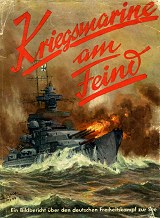 |
Home Intro Technical History Crew Models Gallery Kriegsmarine Archives
More Forum  UPDATES UPDATES |
May 29, 1941
The Naval Side of the War
By H. C. FERRABY
From Greenland to Crete is something more than the forty-five leagues of the old shanty, but the naval activity in these two widely separated areas last week' was once more a demonstration of the fact that the sea is all one. And naval war is the same, whether in the Arctic or the Tropics, though the objective may not be the same. Indeed, these two recent operations are a curiously interesting demonstration of the difference between a primary and a secondary objective in war. The German attack on Crete is a strategical move of primary importance because it aims at the destruction of the enemy forces or, failing that, the nullification of their usefulness by depriving them of an essential base of operations. The excursion of Admiral Luetjens' forces with the new German battleship Bismarck into the waters between Iceland and Greenland was a move of purely secondary importance, concerned with the destruction of his enemy's commercial resources. Yet the odd thing is that in the Cretan operations, so far as we know at present the loss of material to our squadrons was not overwhelming, whereas in the North Atlantic operations a really heavy "destruction of enemy force" was scored by the Germans in an engagement which they certainly were not seeking, and from which they were endeavouring to escape.
The importance of Crete in the British strategical plans needs no emphasis at this period. Its value to us as an advanced base for operations against the ltalo-German convoy lanes to Tripolitania and Libya has been made abundantly clear. In the months before Italy sought, singlehanded, to invade Greece, Admiral Cunningham was compelled to operate from a base 900 miles distant from the scene of action. Then we were presented with the chance to use the island as an advanced base and move our sea forces nearer to their objective. Loss of Crete again must force the Admiral back into the original situation, with all its disadvantages, and that at a time when German drive and initiative are overcoming the inertia of the Italian administration in the war effort in North Africa and making the need for interference with their seaborne supplies to that area more important than ever. It is not so much the use the Germans could make of Crete as the importance of the island to us that made the Battle of Crete an event of major importance in the whole story of the war.
It is yet too early to attempt much commentary on that battle. It has been the first real clash between air tactics and sea tactics, a clash directly between Aery and Navy, since the one side had little usable naval strength and the other had a much-hampered and numerically overweighted aerial contingent. We cannot expect war operations of that sort to develop with the rapidity of an Edgar Wallace serial. Certainly no student of war would attempt, at this stage, to draw lessons from the incomplete knowledge that we possess. The sale point on which stress may be laid, with a view to further consideration later, has been the ability of the naval forces to break up and disperse the first attempts at seaborne support for the aerial invaders. This was done in face of heavy harassing by bombing and apparently also at night by E-boats. After the first two days of operations we had no information of any further attempts by the Germans to move in supplies by sea, but this is in no way conclusive. It may merely have meant that a more elusive method than that of protected convoys was being attempted. And though we were warned that the operations must be expected to involve us in losses, no official news of any sinkings of British warships in the area was issued in the first five days of the fighting.
This is so much in contrast to the normal Admiralty practice of announcing warship losses at the earliest possible moment that we were encouraged to think, over the week-end, that possibly the aerial attack had done no more than damage a few ships. It is true that in the present critical stage of operations everywhere a ship damaged and withdrawn from the fighting line for repair is a "loss" to the fighting strength that can ill be spared, because it is unlikely to be replaced from a non-existent reserve. But it is also true that we can discount completely the German and Italian claims to have sunk at least a dozen of our ships, as far as can be disentangled from their contradictory bulletins.
The loss of the Hood is now fully avenged, was made public very quickly by the Admiralty. Only an hour after I had heard on the wireless the German "Sondermeldung" with Berlin's report of the engagement, the British official story was also being broadcast, not as an "Extraordinary Gazette" -which is the nearest equivalent I can suggest for the German word-but as part of our routine news bulletins. It is evident from the rapidity with which both sides were able to make their announcements that the forces must still be in contact, with no need to preserve wireless silence to conceal their position from each other. This was, perhaps, the most satisfactory aspect of the news from our point of view. All too frequently German ships have had the luck to strike a patch of fog or low visibility under cover of which they could elude further pursuit. It became certain a few hours later that Admiral Luetjens was being sternly pursued, and this despite the general average of 30 knots which the ships most probably working under his orders could maintain. This feature of the engagement is somewhat surprising. It raises a doubt whether the German Admiral was making his test possible speed to throw off the pursuit. And if he was not, why not?
Two reasons suggest themselves, but can be no more than speculations at the moment of writing. One is that the operation which Admiral Luetjens was directing was intended to provide cover for the escape into the Atlantic of a number of surface raiders to strengthen the U-boat war on merchant shipping. The other is that he was covering an expeditionary force to Iceland or possibly even to Greenland, and that he was endeavouring to carry on a delaying operation while the transports reached their destination, or moved out of the path of the Home Fleet.
It is hardly to be supposed that one of the only two German battleships in existence was dispatched on a cruise of two thousand miles in waters where the British Home Fleet might be expected to be encountered without some important mission making her support necessary. She certainly did not go to Greenland to collect local weather reports.
Linked with this operation is the information, apparently well authenticated, that the U-boats are operating much further west in the Atlantic than hitherto. There can only be one cause for this; British anti-submarine methods have made the eastern half of that ocean too unpleasant. Although no definite statement has been made on the subject, it appears to be generally accepted from the tone of Ministers' recent speeches, that there has been an intensification of the attacks on the U-boats with results that are modestly put at "satisfactory." Certainly the toll of merchant shipping in April was much lower than many of us had feared it might be. It amounted to about one-seventh of the monthly total that Hitler demands from his commerce destroyers in order that he may get the war over quickly. If the U-boats are not giving the results and if aircraft are proving to be anything but the angels of destruction that Goering promised they would be, the Nazi Staff find themselves driven back on to the old methods of raiding. So it is not an unreasonable guess that the mission of Admiral Luetjens was to ensure safe passage for a batch of surface raiders-either cruisers or disguised merchantment-or both- thought the known danger area in which our main forces might be encountered.
The sinking of the Hood will be felt as a personal loss by hundreds of thousands of people all over the Empire. It is doubtful if any other British man-of-war has ever been visited by so many people (except, of course, the Victory), for the Hood was one of the Navy's show pieces. She toured the Empire in 1924 and steamed 38,000 miles throughout the Dominions and Colonies. As many as 200,000 people a week walked round her decks and got some faint idea of her remarkable characteristics. But only those who have been privileged to live in her know what a personality the ship had. There was something in her that made her a happy ship. My own first acquaintance with the Hood was in the days when she was running her trials, when John Brown's men had not finally handed her aver to Captain Tomkinson. I was on board when she made her historic run on the measured mile and set a world record for capital ship speed by exceeding 32 knots. I have lived in her since on manoeuvres, and have spent days of ceremonial in her. The Hood was a ship that would always have lived in the memory of those who love the sea, as the Cutty Sark does, and the tragic end but strengthens the certainty of immortality among the ships that men have loved.

| Home Guestbook Quiz Glossary Help us Weights & Measures Video Credits Links Contact |

